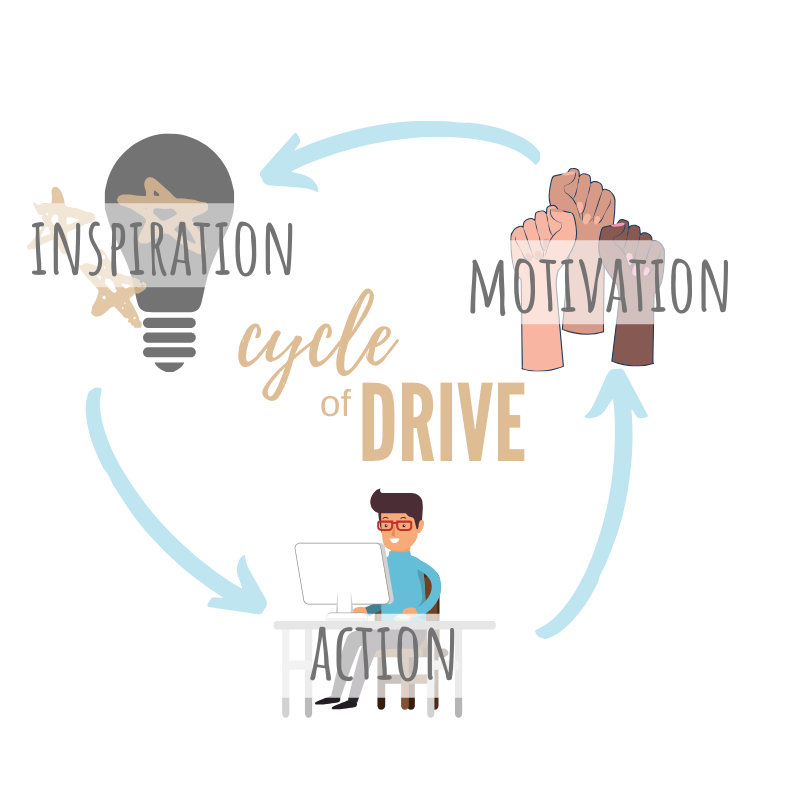
4
Personal Success Strategies
Personal Success Strategies

Time Management
You use time management skills every day. As a college student, you especially need to draw on them to achieve your goals!
One of the best methods of using time effectively and controlling procrastination is to plan when you will do specific tasks. Planning does not mean following a rigid schedule, it means making good decisions about when it is easiest and most efficient to get your work done. Time management means working smarter, not necessarily harder. It’s not about how much time you have, but how well you can manage it. Below we have outlined a few simple things you can do to manage your time efficiently:
Create a schedule
Start with your GBC timetable.
- You can find your GBC timetable in STU-VIEW under “Registration Services." Block all of your course start times as times to work. Even if your online course doesn’t have a set schedule for when you need to read or complete course content, set it up in your schedule anyway. This will ensure that you set aside sufficient time each day to devote to your courses.
Add your work schedule.
- If you are working while taking online classes, make sure you add those to your schedule as well. Depending on your job, don't forget to add in your commute to and from work!
Schedule downtime.
- This is very important. Try to leave seven to eight hours a night for sleep, even if you can get away with five or six. Give yourself an hour for lunch and dinner, so you can relax, socialize or run errands. Schedule time with your family and friends in this section.
By setting your schedule in this realistic way, you will be able to get a grasp on your time. And as things come up, which they will, you will be prepared to tackle it!
Once this timetable is complete, add it to your calendar and turn on notifications.
Use your calendar
So you just went through the exercise above by creating a schedule and adding it to your calendar. You even turned on the notifications as we suggested. Now what?
Well, use it! In the same calendar make note of any important events, like a scheduled live stream of a lecture or a time frame when an online quiz is available. Add in all the due dates for upcoming assignments, presentations and tests in your calendar.
Now you have a robust calendar that will help you avoid falling into a trap of wasted hours in front of a screen instead of working on assignments.
Eliminate distractions
Getting distracted is easy these days. Between cell phones, social media and binge-watching shows, there are a lot of activities that can distract you from doing what is important. As an online student, it's very important to avoid them as much as possible given that you are sitting in front of a screen even more than usual.
When your calendar is blocked off for studying or coursework, turn off your cell phone and sign out of your social media accounts. Turn off the TV, and try to work in a quiet area.
Set goals
Every day try setting yourself specific small goals, like how much reading you will complete, or how much of an assignment you will attempt. Your calendar and master schedule will help you with planning your daily goals. This way at the end of each day you have wins to celebrate. Also, before you know it, your assignments and coursework will be completed on time.
Working on one thing at a time
You might think more is being accomplished with multitasking, but splitting attention between more than one task isn’t an effective way to learn.
As it turns out, we spend more time multitasking than we ever have before, but studies show that 98% of us aren't actually very good at it. Dozens of studies agree that both kids and adults are far less effective as learners, communicators and problem solvers when they're distracted.
You should work on one task at a time, giving it your full attention. Focusing on one task will help you complete it more efficiently and effectively.
Study in shorter bursts
For every hour of studying, take a short 10 to 15 minute break to recharge.
Trying to work on one thing for too long can actually cause your mind to wander more. Taking short breaks is a good way to give your brain a chance to recharge so you can come back more focused.
Have some snacks and water nearby to help stay focused.
How to Overcome Procrastination
Everyone procrastinates to some extent. It is probably the most common time management problem students face when studying online.
The strategies to help you with procrastination are the same that will help you master your time management skills. By doing a few simple things, you can control your procrastination.
Plan out your time.
- A good time plan is probably the single most effective way to control procrastination.
Set a realistic goal.
- Too much of the same thing at once can be pretty daunting. Try splitting up your reading and studying over the course of the week. If you do each activity for 30 minutes to an hour each day instead of leaving it all to one day, you’ll be far less likely to put it off.
Break down your work into smaller tasks.
- Procrastination often results when the task seems difficult, unpleasant or overpowering. Bring the task down to size and make it less intimidating by using this method. As soon as you receive a big assignment, set aside 15 to 30 minutes a day to work on it. By the end of the week, it won’t seem so challenging and you'll have a better understanding of what needs to be done. Manageable, daily periods of work are the key while starting early helps to ensure that due dates will be met.
Also, did you know that procrastination is a habit? According to Mel Robbins, all habits can be conquered and have three parts:
- The trigger (and in the case of procrastination, the trigger is always stress)
- Then there is a pattern to repeat (and in the case of procrastination, it is to avoid doing something)
- And there is a reward (you get some stress relief)
And to fix the habit of procrastination, you need to look at changing step 2: the pattern. And you can do that by following the simple time management strategies we have given you above.

Setting Goals
You've heard about SMART goals before, and there are thousands of resources on the internet that explain what SMART goals are. But we are going to break it down a bit more into tangible George Brown student specific examples to help you set your own SMART goals.
To set a SMART goal you need to be:
Specific: Goals should be written in the most simplistic manner possible, focusing in on one specific outcome. Without this core principle, you might find it hard to focus and, in the end, feel unmotivated.
- GBC Student: I'm going to focus this semester and boost my grade from C to B in Accounting 3007!
Measurable: Goals need to be measurable in such a way that tangible evidence can be presented along the way. It's fun to track your milestones! This can be as simple as setting a specific date for your achievement.
- GBC Student: I'm going to do my work based on my schedule and calendar and meet with my tutor on Wednesdays to prepare for the Accounting 3007 mid-term on July 7th.
Achievable: Goals should be designed like a good workout. They should stretch you slightly, so you feel challenged, but not cause stress or injury.
- GBC Student: I’m going to do two virtual workouts a week from GBC Recreation’s On-Demand Fitness Classes to keep my body moving and boost my energy while I study for the Accounting 3007 mid-term.
Relevant: It's important to examine your goal. Make sure it's relevant and realistic.
- GBC Student: I will finish all the readings and assignments required to do the Accounting 3007 mid-term.
Time-bound: Goals should be linked to a timeframe that creates a practical sense of urgency, creating a healthy tension that will propel you forward.
- GBC Student: I’m going to do two virtual workouts a week from GBC Recreation’s video library to keep my body moving and boost my energy while I study for my Accounting 3007 mid-term.
Students: Accounting 3007 is not a real course, it was used as an example for this exercise!

Stress Management
Stress is a given in our lives and there is no easy way to avoid it. But there are many ways that you can manage it so stress doesn't negatively impact your personal and academic life.
Below we also have a few tips to help you manage some of your stress while you navigate your online semester:
Stay connected
We don't mean to the internet (but do that too!), but to each other. Online courses can be especially isolating as you are doing them by yourself. So make sure you connect with your instructors, classmates, friends and family. Some ways to stay connected at GBC are through Orientation events, Student Association events, clubs, the Volunteer Squad and Peer Mentor+ wellness programs.
Sleep
A good night’s sleep is not only important for online learning success, but for keeping your stress levels manageable. You need between seven to eight hours of sleep to be fully rested. Find the amount that’s right for you, and then try to stick with it. Also, try to stick to the same sleep schedule as much as possible. This will help you create great sleeping habits!
Move your body
Finding time in your schedule to move your body may not be easy but it’s a time-tested way to manage stress for a reason: it works. Moving your body for 30 minutes each day can look different for everybody (you can dance it out, or go for a walk, or do yoga or run...). Whatever you choose to do, it will help improve your mood and create a good break in your day. Reminder: As a GBC student, you have free access to our fitness centres and recreational programs and activities.
Eat well
You already know this. But try to avoid high carb, high sugar foods. Fill yourself up with with healthy high-fiber foods, including fruits, vegetables, protein and whole grains. A healthy diet will help you solidify your sleeping habits, and will also help you when you have to focus on important assignments. Check out the Student Association’s Student Nutrition Access Program (SNAP) for more information on eating well as well as their services such as a food pantry, food hamper delivery, Monday snack bags and more. If you're ever on campus, you can find the Good Food Market on Thursdays, from 11 a.m. to 3 p.m., at 200 King St. E. just outside the bookstore, for some low-cost, fresh and healthy foods!
Get organized
Between your school, work and personal commitments, you’re going to be very busy. An important way to help you manage your stress is to go back to the time management skills we told you about at the beginning of this module, get organized—and stay organized. Keep your desk neat. Create folders on your computer. Map out your quarter or semester and set reminders for important dates. Once you get organized, you’ll feel stress levels go down immediately.
Ask for help
As a George Brown student you are never alone. We are here every step of the way to help you when you need it. So reach out!
Check-in with yourself
Managing stress is not something you do once, and it's done (we wish!!). So, take a moment to regularly check in with yourself to see how you’re feeling, physically and mentally. Be honest with yourself. Then come back to the stress management tips in this module and see what you need to stop, start or rejig to help you with your stress management.

Setting Up a Study Space
Setting up a dedicated study space doesn't mean that you have to go spend a lot of money and get brand new things to do it. It means that you carve out a space in your home where you go to study. This is the spot where you will be able to focus and get your work done. Here are a few ways you can do this:
Set the scene.
- If you like to study in absolute quiet, set up a space in a bedroom or in an out-of-the-way spot. If you thrive in a busier atmosphere, carve out a permanent corner of the kitchen or family room for your studying. Whichever one it is, keep it consistent every day.
Make the space comfortable.
- But not too comfortable! Pick a spot that makes you comfortable, relaxed and allows you to focus. So if you tend to fall asleep when you read in bed, don't set it up as your study spot!
Make it ergonomic (as much as you can).
- Ideally, your study surface should be about waist height. When you sit down, make sure you can set your elbows on the table without hunching up your shoulders.
- You should be able to put your feet flat on the floor. If your chair isn't the right height for that, get resourceful and sit on a pillow or tuck a shoebox under your feet to help them reach the floor. You can even add a rolled-up blanket behind your back to keep it from getting sore.
- Don't forget that your monitor needs to be about 18-30" away and if you have one, an anti-glare screen will help keep your eyes from getting tired.
Don't forget about lighting.
- If you don't have natural light coming into your home, that's okay. Try a combination of overhead lights and a reading or desk lamp that you can aim at your books or computer screen.
Stay organized.
- This tip is both for your study space and your devices. Use boxes, drawers, organizers — whatever you prefer — to keep your space organized. Hang a bulletin board and/or wall calendar to help you keep track of due dates and handy reminders. Get your computer organized too. Files and folders with the right naming conventions will help you find everything you need quickly!
Decorate your space.
- You don't have to buy new things to decorate your space. Grab a few of your favourite items from around your home and add them to your space. Bring a plant, your favourite mug or a clock if you have one. By personalizing your space in a way that brings you joy it will help keep you energized and focused.
Source: 9 Tips for Creating the Perfect Study Space from Scholastic.
Work-Life Balance
Online classes have their own set of challenges, and when you add to those balancing careers and families, it can feel very daunting.
But it doesn't have to be that way. There are a few things you can do to create a healthy balance between all the things you need to do while studying online.
Lean on your personal support team.
- Before you start your studies, talk to your friends and family. Share your calendar with them and let them know how they can support you to achieve your goals.
Ask for help.
- You are NOT alone. Talk to your instructors, coordinators and counsellors to see how they can support you. If you are working let your employer know that you are taking online classes. If you have a partner or children at home, delegate some work to them to help you free up your time to study.
Look at your priorities.
- Look at your schedule and map out what needs to be done first and prioritize. Your well-organized calendar will help you stay focused and tackle all of what you are responsible for (personally and academically) in order of importance.
Give yourself a break.
- Even though you may be under stress, you need to focus on your well-being, too. Make sure to manage your time to get the seven to eight hours of sleep each night and time to move your body daily. Make sure you reward yourself for a job well done. Online classes demand a lot of your time and energy, but it shouldn’t deplete your health, your professional life or your family life. Make sure you take breaks and recharge so you can come back to your studies refreshed and energized!
There are also many students who are taking online classes while they have kids at home. Managing childcare and studies is not an easy thing to do. George Brown College’s School of Early Childhood has put together a list of online resources for families looking for new ways to keep children engaged, active and learning at home as well.
Stay Motivated
Being self-motivated is a skill, and like any other skill, it requires practice to master. To start, you need to work on your mindset. You need to believe that you are in charge of your own education. To get your mindset where it needs to be you have to:
- Practice positive self-talk
- Avoid procrastination
- Keep a consistent schedule
- Give yourself breaks when needed
To continue to be motivated, you need to work and experience the successes of your work. This means you must regularly log in to Brightspace and keep up with the assigned work. Stay in constant communication with your instructors and classmates and ask for help when you need it.

Graphic Source: Delaney Jaye - A New Perspective.
Below is a fun self-assessment from MindTools.com that you can do to get a better understanding of your motivation.
Grab a piece of paper, and for each of the statements below give yourself a score between 1 and 5 (1 being Not at All, and 5 being Very Often). Please answer questions as you actually are (rather than how you think you should be), and don't worry, there are no wrong answers. This activity will just help you better understand how self-motivated you are, and what you can do to improve.
| How Self-Motivated Are You? | Score |
|---|---|
| I'm unsure of my ability to achieve the goals I set for myself. | 1-5 |
| When working on my goals, I put in maximum effort and work even harder if I've suffered a setback. | 1-5 |
| I regularly set goals and objectives to achieve my vision for my life. | 1-5 |
| I think positively about setting goals and making sure my needs are met. | 1-5 |
| I use rewards to keep myself focused. | 1-5 |
| I believe that if I work hard and apply my abilities and talents, I will be successful. | 1-5 |
| I worry about deadlines and getting things done, which causes stress and anxiety. | 1-5 |
| When an unexpected event threatens or jeopardizes my goal, I tend to walk away, set a different goal, and move in a new direction. | 1-5 |
| When I come up with a really good idea, I am surprised by my creativity. I figure it is my lucky day, and caution myself not to get used to the feeling. | 1-5 |
| I tend to do the minimum amount of work necessary to keep others satisfied. | 1-5 |
| I tend to worry about why I won't reach my goals, and I often focus on why something probably won't work. | 1-5 |
| I create a vivid and powerful vision of my future success before embarking on a new goal. | 1-5 |
SCORING:
44-60 high - Wonderful! You get things done, and you don't let anything stand in your way. You make a conscious effort to stay self-motivated, and you spend significant time and effort on setting goals and acting to achieve those goals. You attract and inspire others with your success. Treasure this — and be aware that not everyone is as self-motivated as you are!
28-43 moderate - You're doing OK on self-motivation. You're certainly not failing — however, you could achieve much more. To achieve what you want, try to increase the motivation factors in all areas of your life.
12-27 low - You allow your personal doubts and fears to keep you from succeeding. You've probably had a few incomplete goals in the past, so you may have convinced yourself that you aren't self-motivated — and then you've made that come true. Break this harmful pattern now, and start believing in yourself again!
